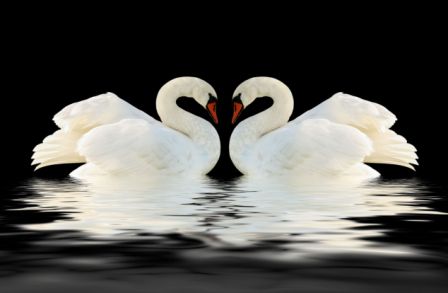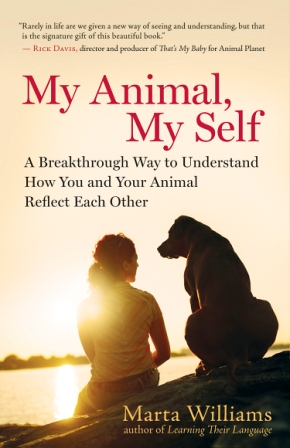A Love Mirrored

Our animals don't just give unconditionally, says one expert. They offer us a reflection of ourselves.

From the book My Animal, Myself: A Breakthrough Way To Understand How You and Your Animal Reflect Each Other. Copyright © 2013 by Marta Williams. Reprinted with permission from New World Library.
PEOPLE WHO LOVE animals know that there is something unique about the connection we can have with them. Love for an animal is often deeper and more intense than anything you may have felt for a person.
What lies behind this intense connection between people and animals is the fact that animals love us in a way that most humans can’t even aspire to. They love us no matter what we look like. They love us even if we are depressed or grouchy. Animals don’t judge us by the standards of modern human society—they look into our hearts and see whether there is a pure light there that they can connect to.
Once an animal catches on to your heart, he or she won’t let go or shut down unless severely betrayed. This is an amazing fact. You will, if you are open to it, find true and abiding love in almost every companion animal you allow into your life. Obviously, many animals have been abused and are no longer so easy to get close to, but once you win their trust, these animals, too, can find the way to heal, open their hearts, and love you unconditionally.
It’s extraordinary, really, and nothing like the emotional obstacle course of human relationships. Psychologist Margot Lasher, who has written two books on the unusual connection between animals and humans, says their capacity for empathy is the reason for this unconditional love. Because of this, “Animals never hurt us the way humans do.” A severely abused animal will shut down, but no animal will ever try to make us feel unloved. Quite the opposite: Animals want love to prevail on all fronts.
According to Lasher, animals are incapable of shutting down their hearts. They have to remain connected to everything in the environment in order to stay safe. The imperative for all nonhuman species is to stay completely connected to all that is happening in the world. I believe this is actually the normal condition for human beings as well; we have modern culture to thank for the fact that we can disassociate. As children we start out just like animals, with a totally open and accepting heart. We don’t forget how it felt, and when we encounter it in animals, we are drawn to it and embrace it.
Since animals can’t shut us out, and they don’t have the ability, let alone the inclination, to ignore us, they come into sync with us. In so doing, they become our mirror. That is why animals are so useful in therapy work. According to equine-assisted learning practitioner Dr. Beverley Kane, animals respond to our true intentions, not to our stated intentions, or even to what we think our intentions are. It’s what I tell my clients all the time—you have no secrets from your animals.
The second factor that makes animals such good mirrors is their proximity to us. In most cases our companion animals live surrounded by our thoughts and feelings, and affected by our actions and lifestyles. Horses may be stabled away from home, but the owner is still their major interface with the world of humans.
What animals do as a result of being around us and exposed so intensely to our ways is to take on and mirror back to us what is going on with us. They become a looking glass for us to see ourselves. Whatever we feel, they feel. What we are thinking, they pick up intuitively and will react to, which means that if they are being annoying or exasperating, it could be because of something going on in us. That is the essence of mirroring. They model our behavior, issues, thoughts, and beliefs because they are connected at all times to us from the deepest possible level of their hearts.

A BIOLOGIST WHO who became an animal communicator, Marta Williams has written several books on understanding animals intuitively. She offers classes and consultations by phone from her home in Northern California. We asked her to elaborate on her ideas.
Explain how you came to believe in the mirroring effect, how and why it works.
It happened over time, very subtly, because it’s a very subtle fi eld. Over time it became clear that a whole lot of what was going on was the animals doing some behavior to try to get a message to their person. It could be, ‘Hey I’m really sick, you need to do something,’ or ‘Hey you’re really sick and need to do something.’ It could be physical, emotional, mental, spiritual, or in life — like a new person in the house that the animal doesn’t like. It could be a million things. Part of the reason I wrote the book was so people can do that on their own, and fi gure out what the interplay is with their animal.
I think most people accept the idea of some imitation or projection with their pets. the leap is to believe that animals act consciously in our interest. everything we are told by science says animals do not act consciously.
It’s actually no longer the case that all the scientific literature takes that position. There are scientists—Marc Bekoff, Rupert Sheldrake, John Bradshaw—who concede that animals have emotion, that animals can think. Science doesn’t support the idea that animals can be as sophisticated as people. But most animal people don’t care about what scientists think. They know their animals, and know their animals are smart. Most animal people don’t have a problem accepting that animals might be acting out to say that something is wrong. The leap for most people is that your animal might be trying to help you. Sometimes what the animal’s trying to say is, ‘You are really going the wrong way— you’re doing something I don’t like.’ I won’t try to prove that a dog would be trying to strategize, because there would be no way to know.
Does mirroring extend to bunnies, cows, snakes, any animal you have?
Any type of animal is as capable of this as any other. In my first book Learning Their Language, I express the belief and theory that all life is sentient and can communicate intuitively. This is the indigenous way, and I absolutely believe it is a natural ability that has been completely repressed in humans but exists in all other life forms.
Suppose I have a problem with my dog’s behavior. Where do I start, in terms of understanding the role of mirroring?
It’s really best for people to read the book. You see other people’s stories, they’re short and instructive, so once you get through them, you will get how it works. Then you go through the questionnaires. By the time you get done with them, you’ll know. It’s like you have to sit down and do the work. Or you can have someone analyze it for you. I might ask someone, ‘The feeling you’re having right now with your animal, when have you had this feeling before? And when before that? Is there a trend?’
How do I know whether it’s me or my partner who is influencing an animal?
Whoever is most bothered by the thing that the animal is doing is probably the one being mirrored. An animal could be mirroring just one person in the household. Dr. Goldstein, whom I interviewed for the book, will ask if anyone else in the family has the problem the animal has. Someone is probably involved.
When that’s not necessarily true is when you’ve adopted a rescue. Like the horse I adopted who was just terrified of everyone: I’m not terrified of everyone, so the mirroring is more like why did I decide to rescue her, and what is our journey together. It’s really complex, it’s not ‘one size fits all.’ It’s not obvious, because mirroring between you and your animal is not conscious. And that takes a little work.
It’s not easy for many of us to acknowledge our negative emotions. Do you find that people are more willing to do this if it helps their pets?
Typically, people really, really want to fix the situation. So I do include a chapter on how to fix the situation if you find something out of balance. People who call me are willing. A lot of times they see something there, but don’t know what it is—and of course they want balance and for everyone to be happy.
But given that most people aren’t aware of their pets mirroring—
I don’t actually agree with that assumption. I think most people are animal-lovers and know that their animals understand them. There’s an experiment: For two weeks, talk to your animal out loud as if you were talking to a person and expect them to understand you. When I say that, most people say they already do that, and “get” that their animal understands them; they just want to learn how to hear back. I really believe that most people on the planet love animals and get that animals are smart.
Mirroring can be direct or indirect. So it’s not always that you have a thyroid problem and your animal has one too. There are a number of elements in it that are what you might call metaphysical, like my contention that animals can read your minds. What you really can’t prove, but so many people have had this experience, is that animals come into our lives and it’s not just accident. Most of the time it’s more like fate. When my radar starts going off that something else is operating in the background is when there’s too much coincidence to be coincidence. When you have a situation like that, I feel like that animal is coming into your life for a purpose.
